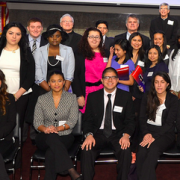Just Employment Policy Model & Article
Just Employment Policy Model presented by Kalmanovitz Initiative at the Ignatian Family Teach-In for Justice 2013.
View Full Document: Just Employment Policy Model
View Full Article: Just Employment and Investment Policies- An Idea Whose Time Has Come
Excerpt from Just Employment Policy Model:
Just Employment Policy Model
PREAMBLE
The Catholic social tradition has steadfastly endorsed the rights of workers since the days
of the Industrial Revolution. Moved by the inhumane treatment of workers, Catholic
leaders such as Archbishop von Ketteler, Cardinal Gibbons and Pope Leo XIII became
allies of the burgeoning labor movement. Since those days Catholics such as Msgr. John
A. Ryan, Mary Harris “Mother” Jones, César Chávez and Dorothy Day have drawn
inspiration from their Christian faith and Catholic social teaching to promote worker
justice. Catholics from around the globe continue to play leading roles in the struggle for
workers’ rights.
Catholic teaching rightly insists on respecting the dignity of all people and posits that
certain rights are necessary for the protection of human dignity and full human
flourishing. As the Compendium of the Social Doctrine of the Church states, the dignity
and well-being of workers requires safeguarding their rights to work, to a just wage, to
form unions, to strike, to safe work conditions, unemployment benefits, health care, a
pension and adequate rest (nos. 287, 301-305). Many of the world’s great religions affirm
these rights, which are also enshrined in the U. N. Universal Declaration of Human
Rights and the International Covenant on Economic, Social and Cultural Rights.
This Jesuit, Catholic institution seeks to embody the Ignatian ideals of cura personalis,
the commitment to justice, and the principles of Catholic social teaching, including the
rights of workers, in all of its policies. Grounded in these ideals, this policy aims to help
[institution’s name] fulfill an important dimension of its mission and strengthen an
essential element of its identity by clearly and specifically enumerating the rights and
principles that should guide all of our employment relationships.
Excerpt from Just Employment and Investment Policies Article:
ave our Jesuit campuses fully lived out their ideals when it comes to the rights of campus workers and the investment of university endowments? . . . . . . . . . A three-year campaign for a living wage for contract workers at Georgetown peaked in 2005, when students went on a nine-day hunger strike. At Loyola New Orleans, a campaign by students and dining services workers crescendoed after a well-loved employee was fired for her union-organizing activity. For administrators, responding to situations like these has been fraught with challenges around neutrality in labor disputes and financial constraints. Given this, it would be easy to dismiss protesting students as radical or naïve. But then, too, we would have to dismiss the challenging call of the late Jesuit superior general Fr. Pedro Arrupe to practice the works of justice:
• First, a basic attitude of respect for all people that forbids us ever to use them as instruments for our own profit.
• Second, a firm resolve never to profit from or allow ourselves to be suborned by positions of power deriving from privilege, for to do so even passively is equivalent to active oppression. To be drugged by the comforts of privilege is to contribute to injustice as silent beneficiaries of its fruits.
• Third, an attitude not simply of refusal but of counterattack against injustice; a decision to work with others toward the dismantling of unjust
social structures so that the weak, the oppressed, the marginalized of this world may be set free.











Leave a Reply
Want to join the discussion?Feel free to contribute!